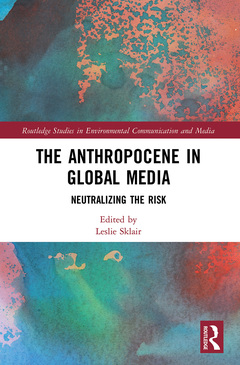The Anthropocene in Global Media Neutralizing the risk Routledge Studies in Environmental Communication and Media Series
Coordonnateur : Sklair Leslie

This book offers the first systematic study of how the ?Anthropocene? is reported in mass media globally, drawing parallels between the use (or misuse) of the term and the media?s attitude towards the associated issues of climate change and global warming.
Identifying the potential dangers of the Anthropocene provides a useful path into a variety of issues that are often ignored, misrepresented, or sidelined by the media. These dangers are widely discussed in the social sciences, environmental humanities, and creative arts, and this book includes chapters on how the contributions of these disciplines are reported by the media. Our results suggest that the natural science and mass media establishments, and the business and political interests which underpin them, tend to lean towards optimistic reassurance (the ?good? Anthropocene), rather than pessimistic alarmist stories, in reporting the Anthropocene. In this volume, contributors explore how dangerous this ?neutralizing? of the Anthropocene is in undermining serious global action in the face of the potential existential risks confronting humanity. The book presents results from media in more than 100 countries in all major languages across the globe. It covers the reporting of key environmental issues, such as the impact of climate change and global warming on oceans, forests, soil, biodiversity, and the biosphere. We offer explanations for differences and similarities in how the media report the Anthropocene in different regions of the world. In doing so, the book argues that, though it is still controversial, the idea of the Anthropocene helps to concentrate minds and behaviour in confronting ongoing ecological (and Coronavirus) crises.
The Anthropocene in Global Media will be of interest to students and scholars of environmental studies, media and communication studies, and the environmental humanities, and all those who are concerned about the survival of humans on planet Earth.
Part I: The Anthropocene and Global Media
1 Editor’s Introduction
Leslie Sklair
2 Anthropocene in the Mass Media: The Big Picture
Leslie Sklair
Part II: Media Coverage of The Anthropocene: A Global Survey
3 Africa’s Anthropocene: A Kaleidoscope of Contradictions
Meryl McQueen and Leslie Sklair
4 The Anthropocene in North America: The Pursuit of the ‘Good’ Anthropocene
Leslie Sklair, Chad Steacy, Jonathan DeVore, and Ron Wagler
5 Challenges and Ideas of Representation of the Anthropocene in Latin American and Caribbean Media
Viviane Riegel, Sofia Ávila, and Jerico Fiestas-Flores
6 The Anthropocene in the Media of North Asia
Leslie Sklair, Ka Ho Mok, and Yuyang Kang
7 South Asia: The ‘Provincializing’ Dilemma Leslie Sklair, JahnnabiDas, and Sunitha Kuppuswamy
8 Latecomers to Capitalism, Latecomers to the Risks of the Anthropocene
Vladimir Vuletic and Eni Buljubašić
9 Western Europe: Planetary Eurocentrism
Boris Holzer and Leslie Sklair
10 The Anthropocene in Middle East Media: Invisible Oil?
Baran Alp Uncu and Ramzi Darouiche
11 Oceania: Big Islands, Small Islands, and the Anthropocene
Leslie Sklair and Astrid Kusumowidagdo
Part III: From the Anthropocene to the Anthropo-scene
12 Media Coverage of the Anthropocene in the Social Sciences and Environmental Humanities
Viviane Riegel
13 Media Coverage of Anthropocene-related creative arts
Leslie Sklair
14 Conclusion: We Need to Talk about the Anthropocene
Leslie Sklair
Appendix 1: countries in Regions
Appendix 2: sources by coverage
Leslie Sklair is emeritus professor of Sociology at the London School of Economics and Political Science. His work has been translated into more than ten languages. He is the President of the Global Studies Association (UK) and, in 2016, the Czech Academy awarded him the František Palacký Medal for his contribution to Historical Sciences.
Date de parution : 05-2022
15.6x23.4 cm
Date de parution : 11-2020
15.6x23.4 cm
Thèmes de The Anthropocene in Global Media :
Mots-clés :
Le Mauricien; environmental media; Tamil Nadu; mass media; Australian National University; climate change; International Geosphere Biosphere Programme; global warming; Jan Zalasiewicz; Anthropo-scene; Anthropocene Narrative; media ecologies; Central African Republic; extinction; Climate Change Denial; AWG; Environmental Issues; Haus Der Kulturen Der Welt; Maristella Svampa; National Academy; Environmental Humanities Scholars; WWF Report; Earth System Science; Anthropocene Epoch; Anthropocene Story; Reassurance Narratives; Anthropocene Studies; Cee Country; Urban Heat Islands; Global Virus Network; Man Era; Al Araby



